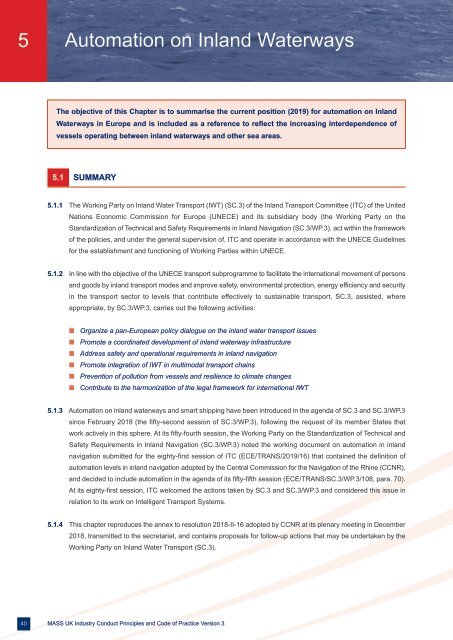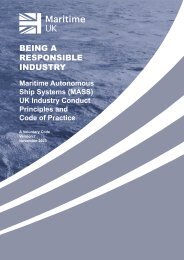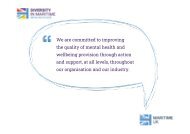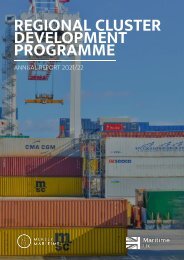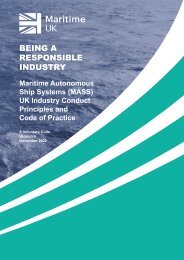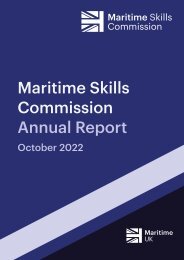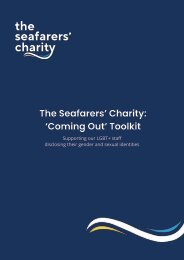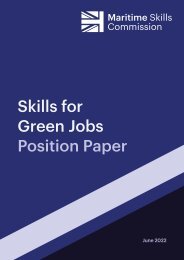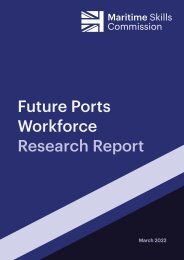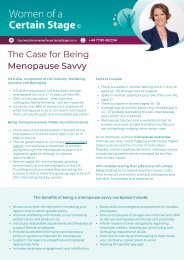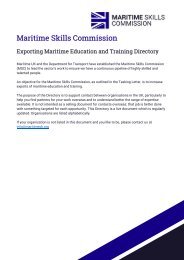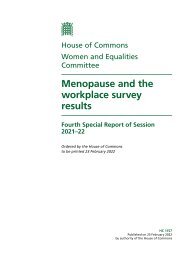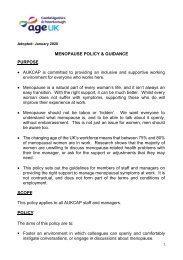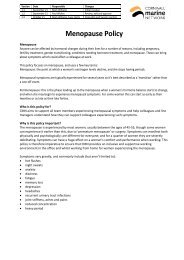code_of_practice_V3_2019
You also want an ePaper? Increase the reach of your titles
YUMPU automatically turns print PDFs into web optimized ePapers that Google loves.
5 Automation on Inland Waterways<br />
The objective <strong>of</strong> this Chapter is to summarise the current position (<strong>2019</strong>) for automation on Inland<br />
Waterways in Europe and is included as a reference to reflect the increasing interdependence <strong>of</strong><br />
vessels operating between inland waterways and other sea areas.<br />
5.1 SUMMARY<br />
5.1.1 The Working Party on Inland Water Transport (IWT) (SC.3) <strong>of</strong> the Inland Transport Committee (ITC) <strong>of</strong> the United<br />
Nations Economic Commission for Europe (UNECE) and its subsidiary body (the Working Party on the<br />
Standardization <strong>of</strong> Technical and Safety Requirements in Inland Navigation (SC.3/WP.3), act within the framework<br />
<strong>of</strong> the policies, and under the general supervision <strong>of</strong>, ITC and operate in accordance with the UNECE Guidelines<br />
for the establishment and functioning <strong>of</strong> Working Parties within UNECE.<br />
5.1.2 In line with the objective <strong>of</strong> the UNECE transport subprogramme to facilitate the international movement <strong>of</strong> persons<br />
and goods by inland transport modes and improve safety, environmental protection, energy efficiency and security<br />
in the transport sector to levels that contribute effectively to sustainable transport, SC.3, assisted, where<br />
appropriate, by SC.3/WP.3, carries out the following activities:<br />
n Organize a pan-European policy dialogue on the inland water transport issues<br />
n Promote a coordinated development <strong>of</strong> inland waterway infrastructure<br />
n Address safety and operational requirements in inland navigation<br />
n Promote integration <strong>of</strong> IWT in multimodal transport chains<br />
n Prevention <strong>of</strong> pollution from vessels and resilience to climate changes<br />
n Contribute to the harmonization <strong>of</strong> the legal framework for international IWT<br />
5.1.3 Automation on inland waterways and smart shipping have been introduced in the agenda <strong>of</strong> SC.3 and SC.3/WP.3<br />
since February 2018 (the fifty-second session <strong>of</strong> SC.3/WP.3), following the request <strong>of</strong> its member States that<br />
work actively in this sphere. At its fifty-fourth session, the Working Party on the Standardization <strong>of</strong> Technical and<br />
Safety Requirements in Inland Navigation (SC.3/WP.3) noted the working document on automation in inland<br />
navigation submitted for the eighty-first session <strong>of</strong> ITC (ECE/TRANS/<strong>2019</strong>/16) that contained the definition <strong>of</strong><br />
automation levels in inland navigation adopted by the Central Commission for the Navigation <strong>of</strong> the Rhine (CCNR),<br />
and decided to include automation in the agenda <strong>of</strong> its fifty-fifth session (ECE/TRANS/SC.3/WP.3/108, para. 70).<br />
At its eighty-first session, ITC welcomed the actions taken by SC.3 and SC.3/WP.3 and considered this issue in<br />
relation to its work on Intelligent Transport Systems.<br />
5.1.4 This chapter reproduces the annex to resolution 2018-II-16 adopted by CCNR at its plenary meeting in December<br />
2018, transmitted to the secretariat, and contains proposals for follow-up actions that may be undertaken by the<br />
Working Party on Inland Water Transport (SC.3).<br />
40<br />
MASS UK Industry Conduct Principles and Code <strong>of</strong> Practice Version 3


